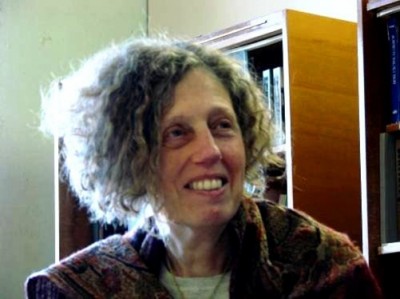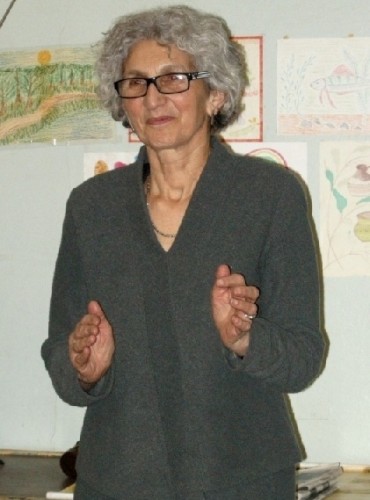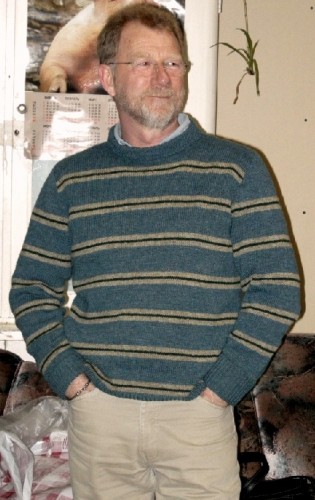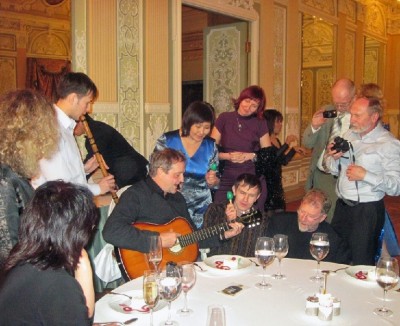The SGA history goes back to the autumn of 1990 when Raymond Blake, a British group analyst visited Leningrad (as it was called at that time), having being invited by some specialists, and conducted a seminar. It was the time when the country had just received an opportunity to learn things which, for decades, would be considered ‘ideologically alien’ and when there was a great interest in psychoanalytical areas in psychology and psychotherapy. So Blake’s visit and his readiness to continue cooperation were appreciated. He gathered around himself all those people who had been interested in psychoanalysis and its areas. These efforts resulted in conducting a constituent assembly in January 1991, which announced the foundation of a public organization ‘the Association of Group Analysis’ (AGA). The first AGA President was Yu.M. Gubachyov, the professor at the Leningrad State Institute of Doctors’ Development, who had been studying psychosomatic relations in medicine. The news about a new professional association, which had a close contact with the London group analyst and which implied organizing the systematic training at our place, spread around the city rather quickly. As a result, during the next two months the AGA was joined by over ten specialists in this area, including such famous persons as M.M. Reshetnikov and V.V. Zelensky. During 1991 Blake visited our city three times. The AGA members familiarized themselves with the theory and participated in a group. Although some members chose other psychoanalytical areas, left the AGA and preferred classical psychoanalysis, analytical psychology or other areas of psychotherapy to group analysis, the remaining core group of 20 people stayed in touch with the British teachers. The seminars with them were held 3-4 times a year, a group gathered regularly. In 1993 G.V. Burkovsky was elected the SGA president. Since then the contacts with the London IGA had broadened and the question about systematic training in Saint-Petersburg had arisen. At the same time the AGA was receiving a status of organization and in 1994 it was registered as a public organization.
The next step in the AGA development was in 1994-1995 when the London IGA started the Introductory Course in Group Analysis which was attended by 32 people, including quite famous specialists. The Course tutors were D. Kennard, J. Roberts and B. Elliot (the head of the organizational committee was G.Kh. Bakirova).
On successful completion of the Introductory Course, which was among the first attempts of systematic training in psychoanalysis in Russia at that time, the AGA stayed in contact with the London Institute to continue training. However, due to insufficient financing the Diploma Course had to be postponed. Some AGA members left group analysis either because the perspective was not clear, or because representatives of other psychoanalysis and psychotherapy areas started their training in Saint-Petersburg. For instance, a group of specialists (E.A. Ivanova, N.M. Lebedeva, D.N. Ovechkin) left the AGA and organized Saint-Petersburg Gestalt Institute. However, the AGA continued to operate and developed its interest in group analysis. It was then that the AGA members formed and conducted the first groups, participated in conferences, published methodical guidelines on group analysis. V.A. Shamov became the President of the AGA, which maintained contact with the London IGA. This resulted in the second Introductory Course in 1997-1998 (the head of the organizational committee was A.V. Molchanova) with 24 participants and J. Campbell, G. VcNally and P. McGraff as tutors. This course was different as it was attended by specialists from other Russian cities and towns (Moscow, Voronezh, Yaroslavl and others) and from Estonia. On coming back home these specialists introduced their colleagues to this area, many of them maintain ed contact with the AGA.
On completion of the course, difficulties with further training arose again. That was the reason why some AGA members took up other projects aiming at teaching group analysis, for example in Ternopol. As the interaction with the London IGA became less intensive, our organization established contact with the New York center of group research (CAGS) with the assistance of H. Stern, a group analyst. In 1998 a training group was created with the assistance of V.A. Shamov, which consisted of the AGA members and which enabled many specialists to get to know the work of this specialist and the technique in this area. Later, the CAGS specialists delivered a two-year training course on the basis of the AGA, the head of the AGA organizational committee being I.V. Pazhiltsev. This course had 28 graduates, including people from other regions of our country. This introduction to the modern group psychoanalysis turned out rather fruitful and influenced the group-analytic practice in Saint-Petersburg.
Also during this period, the AGA decided to focus on organizing its own training, as its members were best prepared in Russia as far as group analysis was concerned. At that time with the help of V.A. Shamov, the AGA president, the course “Basics of Group Analysis” was developed on the basis of EEIP which received the state accreditation. Since then six courses had been delivered in Saint-Petersburg and other cities (Moscow, Norilsk). Also in 2000 he developed the AGA qualification criteria in group analysis, which were to set certain standards in assessing specialists qualification in group analysis based upon their practice. At the same time the first conference was organized and held by the AGA which was to establish contacts and to exchange experience between group analysts from different countries and regions (the organizational committee head was I.V. Pazhiltsev). Since then these conferences have become annual events featuring participants from different Russian cities and European countries. In 2002 I.V. Pazhiltsev became the AGA President and the training courses were conducted not only on the basis of the EEIP but in cooperation with other organizations. There were courses in Barnaul, Novosibirsk, Almaty, Norilsk, Moscow. Since 1995 there have been over 20 courses on the Basics of Group Analysis (the convenors were G.Kh.Bakirova, T.V. Dmitrieva, I.V. Pazhiltsev, V.A. Shamov) with over 300 graduates.
At the same time the AGA Training Committee was organized. Its task was to evaluate the professional level of specialists and to define their qualification status, as well as to evaluate the training courses conducted on behalf of the AGA. Also, the contact with the London IGA became more intense, the aim being to organize the Diploma Course on group analysis in Saint-Petersburg, which would be acknowledged by the EGATIN. For this purpose, in 2003 the contact with D. Kennard and Sue Einhorn (IGA, London) was made and they worked on continuing the training course in Saint-Petersburg.
At first, it was planned to be delivered by joint efforts of the London IGA and the Lithuanian group-analytic society in order to reduce costs of the project. But later the majority of the organization decided to confine itself to the London IGA. Finally, with S. Einhorn’s support the AGA joined EGATIN and received an advanced membership, the courses being acknowledged as introductory.
On electing T.V. Dmitriyeva as president, the re-registration under the laws of the year 2000 became the first issue to tackle. Since that time the public organization named “The Association of Group Analysis” (the AGA) has been a non-profit partnership named “The Society of Group Analysis”. In 2005 the London IGA delivered a Diploma Course in group analysis on the basis of the SGA. For the previous five years training had been the main activity of the SGA. The course convenor was Sue Einhorn, the tutors were Sheila Ernst and Harry Right, as well as Bob Harris who joined the course at its end. This work was continued during the SGA presidency of E.N. Belova, M.I. Erish and E.A.Bilim.
As the training required intense involvement and pressure, all other SGA activities stopped for the time being, although some SGA members continued to conduct training programs on the basis of the EEIP. However, in 2010 the conferences began to be held again, which immediately attracted attention. The Conference of 2010 was the first one to be resumed on completion of the Diploma Course in Saint-Petersburg and turned out to be coincide with the 20th anniversary of the SGA. It was agreed to emphasize the discursive activities, i.e. discussing the reports in groups and having round tables. On completion of the course and the SGA having qualified group analysts, the SGA applied to the EGATIN to reconsider its membership for a full one, which was fulfilled in 2012. At that time O.V. Aksinenko became president of the Society. The SGA Training Committee continued working. It reconsidered the SGA qualifying criteria and the training programs to fit the EGATIN requirements. The training activity was resumed and the SGA members delivered the accredited introductory courses with the perspective of beginning a diploma course on group analysis. The contacts with Russian group analytic organizations, which had developed by that time, expanded, first and foremost, with the Moscow Society of Group Analysis – MSGA, and the Moscow Institute of Group Analysis – MIGA. Also, the contacts with neighboring states – Estonia, Lithuania increased. The communication with the London IGA (represented by Sue Einhorn and Bob Harris) continued. A training course was conducted in Kazakhstan. The development in this direction continued during the last two years during the presidency of G.Kh. Bakirova and L.A. Savinykh. The cooperation with the London IGA enabled to organize a training course in supervision in a group with tutors (Bob Harris and others). The course graduates started their own training programs, including the diploma course in group analysis. Many SGA members joined the Group-Analytic Society International (GASI) with Lev Savinykh as the SGA coordinator with active participation of Sue Einhorn. As a result of this cooperation it has been planned to conduct the Autumn-Winter School in Saint-Petersburg in 2019. A close cooperation with the Israeli Institute of Group Analysis has been established. It is planned to hold a conference in 2020 together with the IIGA and MIGA. Also in 2017 the SGA joined the European Federation Psychoanalytic Psychotherapy (EEPP) group section as a full member. Since 2012 annual SGA conferences have been resumed. They are international and attract specialists from different countries. The jubilee tenth Conference of 2014 dealt with group development. Many interesting materials were about different views on group development and the influence of different factors outside and within a group.
The 2015 Conference held in the 25th year of the SGA (AGA) dealt with different aspects of supervision as one of the most important and inherent part of preparation for group-analytic practice. The topic of the conference was chosen with reference to the training courses in theory and practice of conducting group supervision, which were delivered in Saint-Petersburg and Moscow independently of each other.
The following two years V.A. Shamov was the SGA president. During that period the website was renewed. It regularly covers all events in the SGA, features personal pages of the community members, provides fresh information about all most important events related to the community activity, as well as to the training programs held by the members with the opportunity to join the running groups or get enrolled in new ones (http://groupanalysis.ucoz.ru/). In 2016 efforts were made to organize seminars for those interested in group analysis with foreign specialists from Great Britain and Israel (Garry Right and Avi Berman), the head of the organizing committee were Z.A. Shargalina and S.A. Bugrova. The work on adopting of the Ethics Code continued, the work on adopting the changes to the SGA statute finished. The same work was done in 2017-2018 when I.V. Pazhiltzev was the SGA president. A seminar on big groups by Gila Offer was conducted. The organizing committee of the seminar were S.A. Bugrova, S.I. Kuvshinova, V.A. Yushin and others.
The SGA activity has been covered in social networks such as Facebook and VK in groups and events (for example, the Avi Berman seminar) specially created in these social networks. The SGA members actively participate in different events by colleagues from other regions including conferences (the conference in Moscow “Parental figures in group analysis” held in February of 2016). The SGA members have expanded the educational activity: the lectures on group analysis in the regional department of the EFPP have been resumed. Also two qualification courses are running in Saint-Petersburg (the convenors are T.V. Dmitriyeva and G.Kh. Bakirova) and in Almaty (the convenor I.V. Pazhiltsev).
TIMELINE OF GROUP ANALYTIC TRAINING IN ST PETERSBURG
David Kennard
1990
Valeri Zelensky visits London to establish contact with psychoanalytic therapists and seek their support for the growing interest in psychotherapy in Leningrad. In response, Raymond Blake organizes an exploratory workshop in Leningrad, with Malcolm Pines, Judith Hubback and David Kennard.
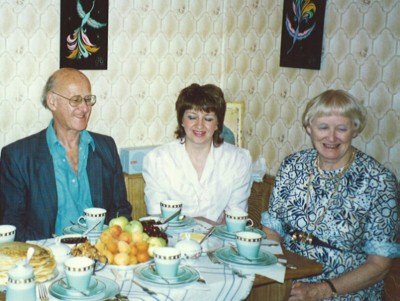
• 1991: Raymond Blake leads a series of workshops in Leningrad, Moscow, Vilnius and Tallinn, along with Malcolm Pines, John Schlapobersky, Liza Glenn and others
• 1992-3: David Kennard, Barbara Elliott and Jeff Roberts conduct group analytic workshops in St Petersburg every six months
• 1993: St Petersburg Association of Group Analysis is formed
• 1995: First Introductory Course in Group Analysis organized by David, Barbara and Jeff over three 4-day blocks. Includes research into effects of using interpreters in group analysis
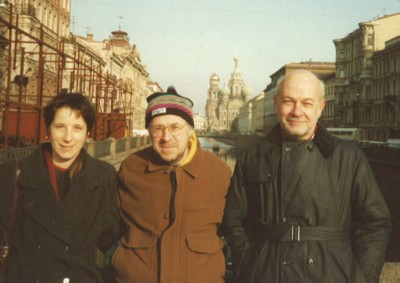
• 1997: Second Introductory course convened by Gerry McNeilly with Jane Campbell and Patrick McGrath
• 1998-2002: Plans for advanced training stall. Failure to get European finding, while ICC focuses on unsuccessful attempt to start group analytic training in Moscow. Links with St Petersburg maintained through Ilya Pazhiltzev.
• 2003-4: Sue Einhorn agrees to take on role of convenor of group analytic training in St Petersburg. IGA agrees to provide financial support from Biddle Fund.
• 2004-5: Prolonged discussions between Sue and David and group analysts in Lithuania to create a joint staff team for St Petersburg don’t work out.
• 2006: IGA International Diploma Course begins in St Petersburg with 32 trainees, meeting 5 times a year for 5 years, convened by Sue Einhorn with Sheila Ernst and Harry Wright, later joined by Bob Harris, plus numerous guest speakers.
• 2011: The Course comes to its end with 26 trainees. Five trainees discuss their experiences at the European Symposium in Group Analysis, London.
